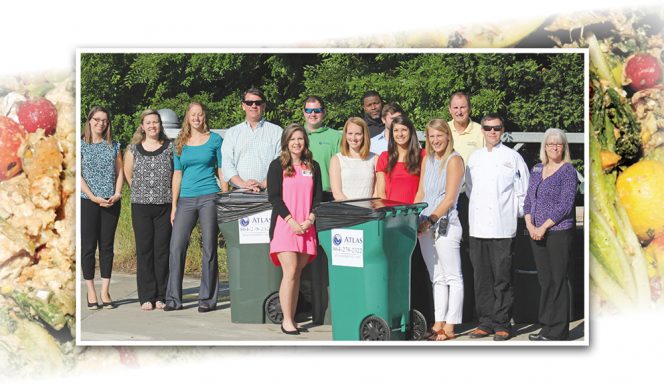Chef assists clients with accurate food ordering. Surplus is donated, and scraps are diverted to a composting facility.
Katrina Mendrey
BioCycle July 2017

The Columbia Metropolitan Convention Center, with the help of its chef, Tommy Kasperski (second from right) and Atlas Organics, diverted 18,000 pounds via donation and composting in the first year of the program.
This is not surprising to CMCC’s Director of Sales, Sarah Britt, who manages the sustainability program at the convention center where the conference was held. The CMCC hosts 325 events a year that draw a total of 290,000 people. “With a facility that welcomes hundreds of thousands of people through annually, we have to be conscious about our energy usage and waste production in order to operate in a financially and environmentally responsible way,” explains Britt.
While the CMCC has identified several paths to operate more sustainably, its recent decision in April 2016 to separate organics and donate leftover food has resulted in over 18,000 pounds of organics diverted. In addition to collecting both pre and postconsumer food waste, the CMCC donates food to two local food banks, recycles cooking oil for use as biodiesel, and encourages its clientele and kitchen staff to be mindful of food waste.
Establishing The Program
Reducing event food waste starts with the planning process. The center requires clients to provide exact attendee numbers three business days prior to their events to help Chef Tommy Kasperski order accurately. For repeat clients, the kitchen keeps records of consumption history to help with precise ordering for future events. Clients are also offered the option of a Chef’s Choice menu at a discounted rate, enabling Kasperski to create a menu last minute based on any surplus items. In addition, notes Kasperski, he is especially diligent when ordering perishable food like lettuce, fish and produce.
CMCC staff delivers extra prepared and unprepared food to two local food banks, Oliver Gospel Mission and Harvest Hope. The food must be stored at proper temperatures, be untouched if prepared and unspoiled if unprepared. Most often, any prepared food that is donated comes from serving buffet style meals, as there is usually minimal excess from well-planned plated meals. Some events present special opportunities for donating food. This past fall, over 1,600 pounds of produce from a food show were donated to Harvest Hope, which accepts the CMCC’s unprepared foods.
In addition, kitchen employees and event staff are trained in the new organics separation process. “It was a lot of work at first to get people in the habit,” explains Kasperski. “We don’t have a lot of staff turnover so old habits can be hard to break. But we just keep sharing our successes and the staff is getting the hang of it.”
Collection And Composting
Kasperski admits he was hesitant about collecting food waste, primarily regarding the possibility of bugs and pests in collection bins. But nearly a year into the program, pests have never been a problem. The bins are collected as needed by Atlas Organics, a local hauler and composting service, which operates in Roebuck, South Carolina, over 90 miles from the CMCC. The convention center’s busy times fluctuate, with peak seasons between January and May and September through November. During peak seasons, organic residuals are picked up Monday, Wednesday and Friday. In the summer months, organics are collected on a case-by-case basis based on the type of event hosted. The Center normally has six 64-gallon bins available. The bins are swapped out for clean ones after each pick up. This is especially important Britt notes, because the bins are used indoors.
Jim Davis, Vice President of Business Development at Atlas Organics, recognizes the importance of clients like CMCC to lead the way for expanding organics separation and compost production in the region. “We are grateful to have partners like CMCC that recognize the importance of changing the face of the largest waste issue we face in the world — even if it’s one bin, one event, one banana peel at a time,” says Davis.
Currently Atlas Organics serves about 100 commercial clients. It collected roughly 4.2 million pounds of organic residuals in South Carolina in 2016, nearly double what was processed in 2015. “This is evidence that compost awareness and participation is growing in South Carolina,” notes Davis. “Chef Tommy, Sarah Britt and the whole crew at CMCC and many of our other clients are excellent partners in action and awareness.”
At CMCC, food waste reduction and diversion are among the sustainability measures taken to reduce the convention center’s footprint. It recycles all glass, plastic and paper and is in the process of upgrading all lighting to more efficient LED fixtures.
CMCC’s progress reducing food waste and diverting organics has not gone unnoticed. At the end of the food recovery conference in February, a behind the scenes sustainability tour of the CMCC’s food diversion operations was provided. “This was a great opportunity for us to showcase our accomplishments, particularly in regard to reducing food waste,” recalls Britt. “We’re proud we’ve achieved our goal of diverting or donating 100 percent of our back of house food.”
Katrina Mendrey is a BioCycle Contributing Editor and program coordinator at Montana State University’s Western Agriculture Research Center in Corvallis, Montana. She can be reached at kmendrey@montana.edu.










